Experiencing Organ Systems Pharmacology First Hand: Thinking beyond the Cell
The current student of pharmacology cannot help but recognize that the discipline is among the most integrative and exciting curricula in graduate school. Perhaps the most challenging obstacle facing pharmacologists is that many potential new drugs are effective in cell models but will fail when studied in the context of an animal model. Therefore, it is of crucial importance that we, as students, learn to look beyond the cell and examine therapeutics in vivo, making use of tissue and organ systems.
For this reason, the National Institute of General Medical Sciences began an initiative several years ago to provide training opportunities in integrative organ systems pharmacology (IOSP) at several universities. Currently, the workshop-style courses are offered at Michigan State University, University of Nebraska, University of North Carolina at Chapel Hill, and Vanderbilt University. Each course is unique and has varying degrees of breadth and depth to appeal to individual student interests. For example, the University of Nebraska course emphasizes both cardiovascular pharmacology and neuropharmacology, while the Vanderbilt course focuses primarily on metabolic syndrome.
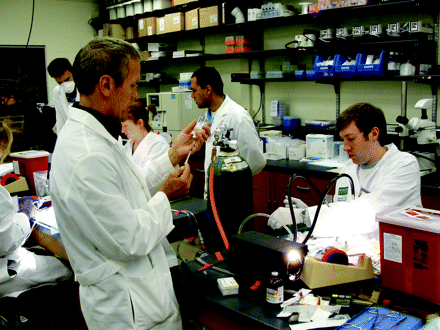
In June 2010, under the encouragement of my advisor and fellow students, I enrolled in the IOSP short course at Michigan State University (MSU) (http://www.phmtox.msu.edu/sc/index.html). What specifically appealed to me about the MSU short course was that it offered the broadest coverage of topics surrounding many different organ systems. For twelve days I lived on the MSU campus in East Lansing while attending daily short-course sessions offered by the Department of Pharmacology and Toxicology. I believe it has become a valuable aspect of my graduate education and will likely influence the way I conduct research and think about experiments for years to come. The benefits I have gained are also likely to help students and professionals in other areas of biomedical science and at different stages of their careers.
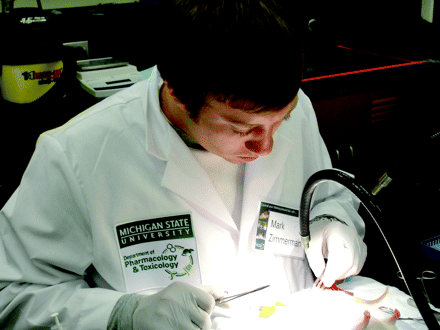
Who Takes the Short Course and Why?
As a graduate student in the University of Pittsburgh’s Molecular Pharmacology Graduate Training Program, I have chosen to focus my thesis research on cancer pharmacology in the context of a novel, genetically engineered mouse model. When designing my project, I kept in mind the importance of acquiring a broad skill set and the value that experience working with animals would have on my future career in biomedical research.
I decided to enroll in the short course, not to introduce myself to animal research, as many do, but rather to build upon the foundation I already had obtained from creating a mouse model and undertaking its preliminary characterization. My expectation was to be able to use some of the diverse techniques taught in the course in conjunction with my own research at the University of Pittsburgh. I thought at the very least I would get more exposure to working with different types of animal systems and to research areas which could benefit my research in the future. As it turns out, the IOSP short course fulfilled both of these personal goals to an extent that I had not anticipated.
One of the things that impressed me the most about the short course was the diversity of students that were enrolled. Indeed, the other students in the course included graduate students, postdocs, and junior faculty members, as well as industry professionals. Not only were the students representative of many different areas of science, but they also came from diverse geographic regions, including the United States, Europe, and Asia. It was a great experience getting to interact with this diverse group of people and benefit from their unique backgrounds and perspectives. The short course gave me the impression of being at an international meeting but in the context of an intimate workshop. Many students were there to learn specific techniques that they would utilize in their own studies, while others were there to learn how animal research is conducted. Regardless, the format of the short course is able to accommodate all types of students with very different objectives.
What I Learned in the Course
What appealed to me the most about the MSU short course in particular was the depth of topics it covered. What I sought was a general knowledge of many organ systems; thus, I decided that the course offered at MSU was the most advantageous for me. The course was divided into several sections over an intensive itinerary of eleven days. These sections included lectures, demonstrations, and laboratory exercises all designed to emphasize the importance of studying pharmacology beyond cell-based models.
The course began with an introductory discussion pertaining to the proper way to design an experiment using power analysis as well as the principles that underlie Good Laboratory Practices (GLP). The concept of GLP was of particular interest to me because it is something more likely observed than taught in the academic setting. In addition to the basic principles of working with animals, we were also given a hands-on demonstration of how to collect and process tissues for analysis. For those without experience working with live animals, this was an important preface to the experiments that would follow later in the week.
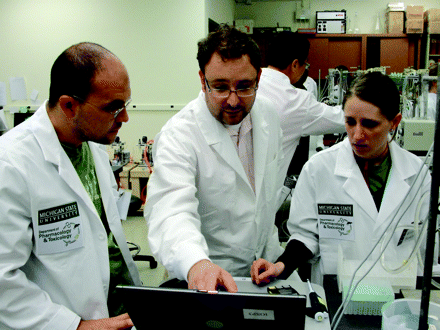
The laboratory exercises included techniques in cardiovascular, gastrointestinal, liver, renal, neurological, and autonomic functions. Although I was interested specifically in the techniques that could be used in the phenotyping of a novel mouse strain, all of the techniques are of possible future use. In fact, when studying the pharmacology of new drugs and compounds, it is extremely important to take into consideration off-target effects on peripheral systems as well. For this reason, knowledge of physiology and how to answer questions pertaining to different organ systems is an essential tool for a pharmacologist to have. A sample of the techniques that we learned is summarized in Table 1, which indicates that the short course covered a wide range of topics and encompassed multiple experimental techniques.
Summary of Topics and Corresponding Techniques
One of the most useful techniques in the modern study of pharmacology is the ability to use living tissues to determine the therapeutic effects and efficacy of compounds. Therefore, the short course included in vitro lab practica in which aortic ring and gastrointestinal preparations were used to examine the effects that commonly used drugs have on organ systems. This was complemented with practica utilizing in vivo models in which drugs were administered to animals and autonomic and renal functions were monitored. This is a very informative method of gaining information on pharmacokinetics that can be applied in any number of research settings.
The in vivo monitoring of vital statistics and delivery of therapeutics is an extremely useful and often necessary ability for pharmacologists. The laboratory exercises included both arterial catheterization and brain cannulation. These are very useful and versatile techniques and may be applied experimentally to test a great deal of hypotheses. Completing the procedure at MSU, as compared to just having learned about the technique in a lecture, has made me confident that I could carry out the technique in my own laboratory.
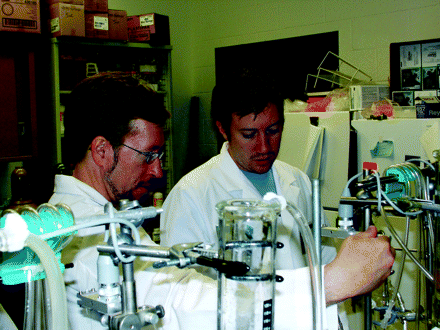
A demonstration of the surgical technique and applications of radio telemetry was also among the most practical topics covered in the short course. Radio telemetry is a complex and expensive system to implement; nonetheless, it is considered by most to be the gold standard and by some the only meaningful way to monitor cardiovascular function. It was, therefore, very valuable to get experience with this technique, which otherwise may have remained inaccessible to me for some time.
As science and technology move forward, the importance of in silico screening and computer-based modeling to pharmacology becomes ever more important. The short course included a session in which the effects of disease states and pharmaceutical intervention in humans were modeled virtually. This was an important exercise as it took the focus away from animal models and forced us to examine the wider relevance of what we were learning. Despite how easy it may be to get caught up in the details of an experiment, it is important for us as pharmacology students to keep in mind that what we do actually relates to the health and well-being of people in general. By simulating pharmacologic principles in humans, it becomes easier for students to translate their classroom and laboratory experiences and understand how these concepts affect us every day.
One of my particular interests is in the drug discovery and development process, and I was delighted when an entire afternoon was devoted to an interactive simulation highlighting the journey of taking small-molecule therapeutics through the laboratory and clinic to the market. This session was led by three pharmaceutical industry veterans, who shared their own personal experiences working with compounds in the pharmaceutical pipeline and raised the questions researchers face at each stage of development. It became evident through this exercise how enormous the challenge is to conduct research in an FDA-regulated environment and to handle the responsibility of protecting patients and circumventing potential threats to their health. In fact, one of the most promising drugs we carried through this simulation turned out to be highly carcinogenic despite its efficacious profile. This is an alarming reality frequently confronted by scientists in the pharmaceutical industry. The goal of this exercise was not only to illustrate how drugs are brought into existence, but to experience the effort it takes for researchers to communicate and to make decisions as a team.
“Despite how easy it may be to get caught up in the details of an experiment, it is important for us as pharmacology students to keep in mind that what we do actually relates to the health and well-being of people in general.”
As evidenced by this exercise, I felt the leaders of the course did an excellent job of bridging the practical experience of work in the lab to both academic and industrial research. Too often the problem with educational experiences is that students are afforded a great deal of knowledge without any appreciation for its application and relevance to the real world. This was not the case with my experience in the MSU short course, as theoretical concepts were given practical applications that were then translated to their use in academia and industry.
The course directors succeeded in accommodating students with various interests and individual goals. The course concluded with an afternoon session where students chose the techniques that they wanted to learn or re-learn as well as additional opportunities to interact with any of the faculty members. I decided to take this opportunity to become more proficient at some basic procedures that are most relevant to my current research, such as tail vein injections and oral gavage. This was an excellent conclusion to an extremely successful period of learning and communication.
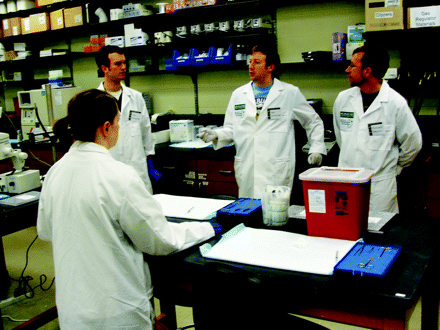
Ethical Considerations
When using animals in biomedical research, it is enormously important to consider the relevant ethical implications that arise. For this reason, a significant time period was devoted to reflecting on the need for animal models in research and their appropriate uses. As students and researchers of pharmacology, it is our duty to ensure that the data collected from animals are necessary, meaningful, and directly relevant to human health. We extensively discussed the importance that data collected from animals currently has in biomedical research. After an experience such as the IOSP short course, it becomes easy to understand the relevance of integrative research and what we can accomplish through the privilege of conducting animal research. Another important facet of research that we discussed was the importance of advocacy and the responsibility that we, as scientists, have in educating the public about what it is we do, why it is important, and how public health is affected.
Beyond the Learning
What I took away from the IOSP short course was not just a new set of skills and techniques, but also what I gained from interactions with faculty, students, and staff. Expanding my personal and professional networks is something I constantly strive to do, and this experience was a great opportunity to do just that.
Overall, I am extremely grateful that I was given the opportunity to experience integrative pharmacology in this format. I have benefitted greatly from the exposure to new techniques and interaction with fellow scientists from all over the world. I would very much encourage anyone considering this type of training to seek out the opportunities that are available regardless of their level of prior experience and stage of their career.
- Copyright © 2010



